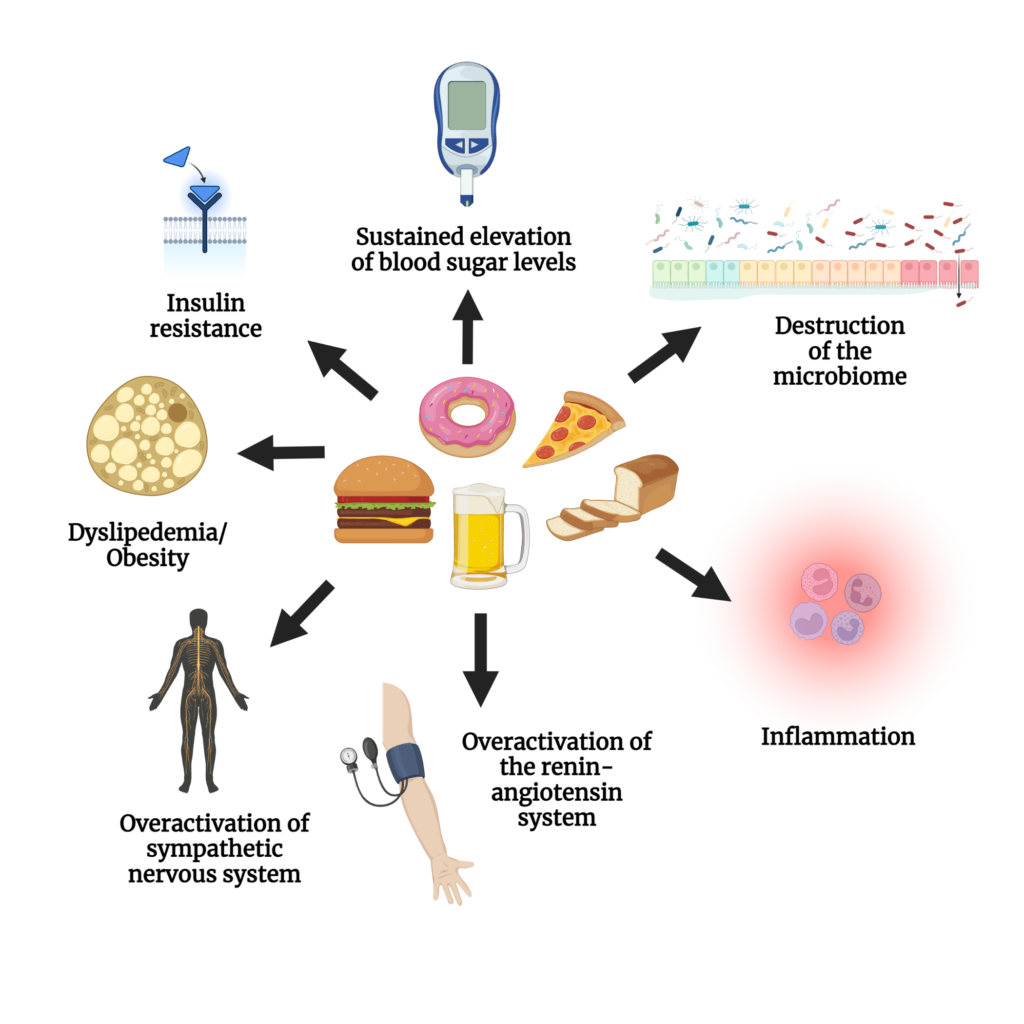Summary
- The Western diet, characterized by excessive consumption of processed food, unhealthy fats, added sugars, and low fiber content, has been linked to various health concerns, including cancer.
- The Western diet promotes inflammation and oxidative stress due to the lack of essential nutrients and dietary fiber found in processed foods, creating optimal conditions for cancer cell growth.
- The excessive caloric intake and obesity associated with the Western diet contribute to higher obesity rates and inflammation, which can fuel tumor growth.
- The low fiber content of the Western diet alters the gut microbiome, leading to dysregulation and reduced diversity of helpful microorganisms, potentially promoting gastrointestinal and esophageal cancers.
With the fast pace we all live at, the Western diet brings a sense of perceived comfort and ease for many. The Western diet is characterized primarily by the excessive consumption of processed food, unhealthy fats, added sugars, and low fiber content [1]. You probably already know that this diet has been linked with various health concerns – most alarmingly, cancer. In this article, we’ll explore some of the various ways in which the Western diet could contribute to the development and progression of cancer.
What is the Western Diet?
The Western diet is rich in excess – massive portions, high calories, and superfluous sugar [2]. The additional sugar –consumed by way of unhealthy (though admittedly addictive yummy) foods such as candy, cake, and cookies – account for “empty” calories contributing no nutritional value whatsoever [2]. The Western diet is also high in saturated and trans fats, which can increase the levels of low-density lipoproteins (also known as LDLs). The overproduction of these molecules in the body have been found to be responsible for blockages through the calcification of the walls of arteries and veins [3].
There are also immune implications to the Western diet. When fed a high-fat diet similar to the Western diet, mice were found to have higher levels of inflammation and sepsis when compared to a high-fiber diet [4]. Additionally, the overfeeding associated with the Western diet can cause obesity, resulting in conditions that promote accelerated aging, as well as carcinogenesis (the promotion of cancer development) and resistance to cancer therapies [5].
Take a look at Figure 1, which summarizes how the Western diet impacts various biological systems in the body.

Figure 1. The impact of Western diet on various aspects of human biology and the incidence of chronic disease, including cancer, diabetes, high blood pressure, obesity, etc. (Created with Biorender.com) [13]
The Western Diet Promotes Inflammation and Oxidative Stress
Processed food makes up a huge part of the Western diet. In fact, surveys conducted in the United States, Canada, New Zealand, Brazil, and several European countries suggest that processed foods on average contribute a whopping 25-50% of total daily calorie intake. These processed foods lack the essential nutrients, antioxidants, and dietary fiber needed for nutritional balance. In a population-based cohort study conducted on 104,980 participants in France, it was found that just a 10% increase in the intake of ultra-processed foods was associated with a statistically significant higher overall cancer risk of greater than 10%! [6] A lack of dietary fiber has been linked to increased permeability and modified pH of the gut [7].These changes result in chronic inflammation and oxidative stress, which create the optimal conditions for cancer cell growth.
The Western Diet Promotes Excessive Caloric Intake and Obesity
Countries with Western diets also tend to have higher obesity rates, with low-income countries suffering the most as inexpensive and highly processed foods flood the market [8]. The excessive amounts of calories, fat, and sodium consumed in a Western diet account for over 13% of the daily caloric intake, with 47% of these calories being attributed to added sugars [2]. Diets rich in fats and sugars translate to higher obesity rates and inflammation across populations [10]. Obesity results in the overaccumulation of adipose tissue – tissue made of fat cells – which releases hormones and molecules that promote inflammation and fuel tumor growth [11].
The Western Diet Alters the Gut Microbiome
The low fiber content of the Western diet can also lead to dysregulation of the gut microbiota – the community of helpful microorganisms living in our digestive tract. The diversity of the gut microbiome decreases with the introduction of a high-fat and high-caloric diet like the Western diet [11]. In fact, the Western diet has been linked to the promotion of gastrointestinal and esophageal cancers by promoting changes in the microbiome which can lead to insulin resistance and obesity, among other negative changes [12].
To learn more about how diet effects the gut microbiome click here.
Tying it All Together
While the Western diet is undoubtedly an incredibly popular choice for many because of its simplicity and easy access, its long-term impact on our health is too scary to ignore. The excessive intake of processed foods, high levels of unhealthy fats, added sugars, and a lack of essential nutrients and fiber has been established to create an environment that promotes the development and progression of cancer, as well as many other chronic diseases.
Instead, a diet rich with plant-based foods, healthy fats, and nutrient-rich foods can be a good diet alternative. You can consult Hope4Cancer.com for some recipe ideas from our nutritionists.
Check out one of our latest recipes here for some diet inspiration!
References
[1] Mehta RS, Song M, Nishihara R, et al. Dietary Patterns and Risk of Colorectal Cancer: Analysis by Tumor Location and Molecular Subtypes. Gastroenterology. 2017;152(8): 1944-1953.e1.
[2] Wartella EA, Lichtenstein AH, Boon CS, editors. Institute of Medicine (US) Committee on Examination of Front-of-Package Nutrition Rating Systems and Symbols. Front-of-Package Nutrition Rating Systems and Symbols: Phase I Report. Washington (DC): National Academies Press (US); 2010. p. 4. Overview of Health and Diet in America.
[3] Rakhra V, Galappaththy SL, Bulchandani S, et al. Obesity and the Western Diet: How We Got Here. Mo Med. 2020;117(6): 536-538.
[4] Napier BA, Andres-Terre M, Massis LM, et al. Western Diet Regulates Immune Status and the Response to LPS-Driven Sepsis Independent of Diet Associated Microbiome. PNAS. 2019;116(9):3688–3694.
[5] Zitvogel L, Pietrocola F, Kroemer G. Nutrition, inflammation and cancer. Nat Immunol. 2017;18(8): 843-850.
[6] Fiolet T, Srour B, Sellem L, et al. Consumption of ultra-processed foods and cancer risk: results from NutriNet-Santé prospective cohort. BMJ. 2018;360:k322.
[7] Swann OG, Kilpatrick M, Breslin M, et al. Dietary fiber and its associations with depression and inflammation. Nutr Rev. 2020;78(5): 394-411.
[8] Fox A, Feng W, Asal V. What is driving global obesity trends? Globalization or “modernization”? Glob Health. 2019;15(32).
[9] US Department of Health and Human Services. US Department of Agriculture. 2015-2020 Dietary Guidelines for Americans. 8th ed. Dec 2015.
[10] Coppack SW. Pro-inflammatory cytokines and adipose tissue. Proc Nutr Soc. 2001;60(3): 349-356.
[11] Martinez KB, Leone V, Chang EB. Western diets, gut dysbiosis, and metabolic diseases: Are they linked? Gut Microbes. 2017;8(2): 130-142.
[12] Tong Y, Gao H, Qi Q, et al. High fat diet, gut microbiome and gastrointestinal cancer. Theranostics. 2021;11(12): 5889-5910.
[13] Malasza ID, Malesza M, Walkowiak J, et al. High-fat, Western-style diet, systemic inflammation, and gut microbiota: a narrative review. Cells. 2021; 10(11): 3164.



